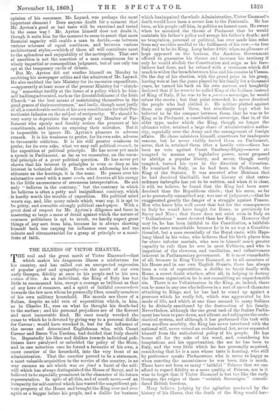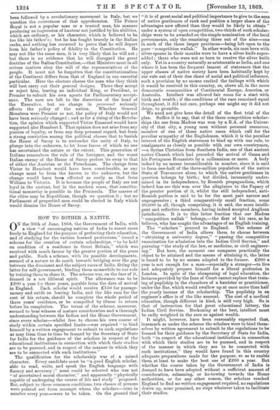THE ILLNESS OF VICTOR EMANUEL.
THE real and the great merit of Victor Emanuel—that which makes his dangerous illness a misfortune for his country, and has called out an unexpected expression of popular grief and sympathy—is the merit of our own early Georges, fidelity at once to his people and to his own raison d'être. As an individual, the King of Italy has but little to recommend him, except a courage as brilliant as that of any hero of romance, and a spirit of faithful camaraderie towards the few men whom he personally likes, usually members of his own military household. His morals are those of a Sultan, despite an odd vein of superstition which, in him, as in Charles II., rose on what he thought his death-bed to the surface ; and his personal prejudices are of the fiercest and most immovable kind. He once nearly wrecked the cause to which he is devoted by giving way to a personal dislike for Cavour ; would have wrecked it, but for the influence of the serene and determined Englishman who, with Count Cavour and Baron Von Usedom, had decided that Italy should be. Repeatedly his likes and dislikes towards individual poli- ticians have paralyzed or enfeebled the policy of the State, and in one notorious ease he forced a favourite of his own, a mere courtier of the household, into the very front of an administration. That the courtier proved to be a statesman, a most valuable acquisition to the service of the country, in no way excuses an act which was au fond a burst of the self- will which has always distinguished the House of Savoy, and is believed to be especially prominent in the character of its future representative. In spite of all this, and of much more,—of an incapacity for self-control which has wasted the magnificent pri- vate property of the House and brought the King over and over again as a beggar before his people, and a dislike for business
which hasimpaired the whole Administration, Victor Emanuel's death would have been a severe loss to the Peninsula. He has been, as his people call him, in politics an honest man. He swore when he mounted the throne of Piedmont that he would maintain his father's policy and avenge his father's death; and no temptation, personal or political, has ever made him relax from any sacrifice needful to the fulfilment of his vow,—to free Italy and to be its King. Long before 1860, when no glimmer of hope appeared on the horizon, the Austrian Government offered to guarantee his throne and increase his territory if only he would abolish the Constitution and reign as his fore- fathers had done, and he refused with a sternness which did much to widen the breach between him and his cousins in Vienna. On the day of his election, with the grand prize in his grasp, having won at last the game played by his family for a thousand years, he turned his back on his own success, and haughtily declared that if he were to be called King of the Italians instead of King of Italy, if he was to be a pat yenu sovereign, he would refuse the crown ; but that point conceded, he never deceived the people who had yielded it. He neither plotted against them nor oppressed them, but steadfastly kept what he believed to be the compact between them, that he was to be King as in Piedmont, a constitutional sovereign, that is, of the older type, under which the King, though no longer the ultimate ruler, retained a large share of administrative autho- rity, especially over the Army and the management of foreign affairs. He chose ministers himself, sometimes for inadequate reasons, but he never visibly forced them on Parliament, never, that is, retained them after a hostile vote—there has been no vote against Count Cambray-Digny—never at- tempted to assume any legislative power, never proposed to abridge a popular liberty, and never, though sorely tempted, turned his eyes in the direction of Ciesarism. He remained in Italy, as he had been in Piedmont, the King of the Statute. It was asserted after Montana that he had deceived Garibaldi, but the history of that extra- ordinary imbroglio has yet to be written, and when it is clear, it will, we believe, be found that the King had been more deceived than the Republican chiefs ; that his error, so far as he personally committed any, was One of judgment,—that he exaggerated greatly the danger of a struggle against France. Men who know him well assert that but for the consequences to Italy he would have fought for Rome, as previously for Savoy and Nice ; that there does not exist even in Italy an " Italianissimo " more devoted than her King. However that may be, he has been faithful to the Constitution, a faithful- ness the more remarkable because he is in no way a Constitu- tionalist, but a man essentially of the Royal caste, with Haps- burg blood in his veins, who believes that his birth places him far above inferior mortals, who sees in himself much greater capacity to rule than he sees in most Cabinets, and who is impatient. of the slowness, and vacillation, and talkativeness inherent in Parliamentary government. It is most remarkable of all, because in King Victor Emanuel, as in all members of his House and in our own English Stuarts, there has always been a vein of superstition, a dislike to break finally with Rome, a secret doubt whether, after all, in helping to destroy the Roman organization he is not committing an unpardonable sin. There is no Voltairianism in the King, as, indeed, there can be none in any one who believes in a sort of sacred character attaching to Kings, and he has had to stand up against a pressure which he really felt, which was aggravated by his mode of life, and which at one time seemed to many Italians to be divinely sanctioned by the destruction of his family. Nevertheless, although the one great task of the Italian Parlia- ment has been to pare down, and affront, and subjugate the eccle- siastical system, and although it has performed this task with even needless acerbity, the King has never interfered with the national will, never vetoed an ecclesiastical Act, never separated himself from the anti-clerical policy of his people. He has borne all for the sake of his word, and, considering his temptations and his opportunities, the use he has been to Italy, and the very little which he has personally acquired, considering that he is a man whose taste is hunting, who still by preference speaks Piedmontese, who is never so happy as when enacting the mountaineer he was born, this is much.
There have not been so many " faithful " Princes that we can afford to regard fidelity as a mere quality of Princes, nor is it wise to forget that if Victor Emanuel is but too like the early Georges, the reigns of those "swinish Sovereigns" consoli- dated British freedom.
Many believe, judging by the agitation produced by the history of his illness, that the death of the King would have been followed by a revolutionary movement in Italy, but we question the correctness of that apprehension. The Prince Royal is not a popular man or a trusted man, his manner producing an impression of hauteur not justified by his abilities, which are ordinary, or his character, which is believed to be too like his father's ; but he has fought bravely in the Italian ranks, and nothing has occurred to prove that he will depart from his father's policy of fidelity to the Constitution. He may not like the same men, it is very likely that he will not ; but there is no evidence that he will disregard the great doctrine of the Italian Constitution,—that Ministers must in all serious matters obey the will of the representatives of the people. It must not be forgotten that the constitutionalism of the Continent differs from that of England in one essential particular. Here the electors choose the man who they think will best carry out their general designs. There they accept or reject him, leaving an individual King, or President, or Premier to submit his own agents for Parliamentary accept- ance. The men are left to the discretion of the head of the Executive, but no change in personnel seriously affects the policy of the nation. Whether General Menabrea were Premier or not, the policy of Italy would not have been seriously changed ; and as for a rising of the Revolu- tion, the opinion which supported Victor Emanuel would have supported also Humbert I. That opinion does not arise from any passion of loyalty, or from any deep personal regard, but from a strong conviction among the political classes that to banish the House of Savoy is to surrender the unity of Italy, to plunge into the unknown, to let loose forces of which no one has ascertained the nature or the extent. This generation of Italians remembers the rule of the foreigner, and the worst Italian enemy of the House of Savoy prefers its sway to that of either the Austrian or the Frenchman. The change from Victor to Humbert would have been considerable, as any change must be from the known to the unknown, but the change would have beea effected as easily as that from William to Victoria. It is because the people of Italy are not loyal in the ancient, but in the modern sense, that constitu- tional monarchy is possible in the Peninsula. The masses of the cities may be Republican, though we question it ; but no Parliament of propertied men could be elected in Italy which would dismiss the House of Savoy.



































 Previous page
Previous page